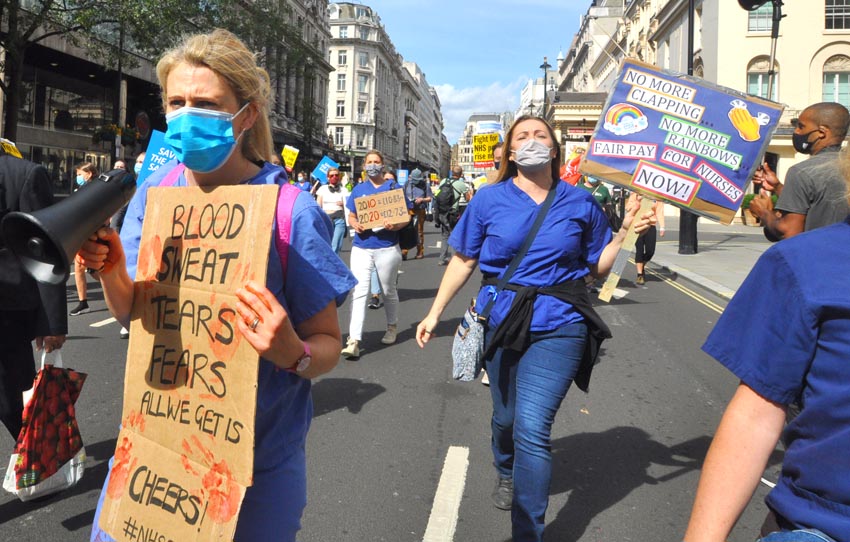THE GAP between the first and second dose of the Pfizer/BioNTech coronavirus vaccine must be reduced to three or four weeks to ensure it is effective, senior doctors insisted yesterday, challenging the Tory policy of delaying the second dose for at least 12 weeks.
Health Secretary Hancock was left floundering when challenged on the question yesterday morning.
Dr Chaand Nagpaul, BMA chairman, pointed to analysis from the World Health Organisation that said second doses of the Pfizer vaccine should only be delayed ‘in exceptional circumstances’ and recommended a gap of four weeks between doses, saying: ‘The concern we have if the vaccine’s efficacy is reduced then of course the risk is that we will see those who are exposed maximally to the virus may get infected.’
The BMA has written to the government’s Chief Medical Adviser Chris Whitty to express its concern over the gap between doses, saying the policy is ‘difficult to justify’.
‘The absence of any international support for the UK’s approach is a cause of deep concern and risks undermining public and the profession’s trust in the vaccination programme,’ it said.
The letter also expressed concern that one dose of the Pfizer vaccine ‘does not produce sufficient neutralising antibodies and the potential to reduce transmission’.
Hancock was asked on Sky’s Sophy Ridge on Sunday yesterday: ‘There are very real concerns now about this policy of delaying the second dose to twelve weeks where it was three to four weeks. The scientists themselves are saying we just don’t know what effect that will have on the efficacy of the vaccine when you look at the double dose with that sort of gap in between.’
Hancock replied lamely: ‘What we do know is that this policy is going to save lives. And the reason we know that is that so long as there is decent efficacy after the first dose, and we have a high degree of confidence that that’s the case then, in a situation where there is only a limited supply, because we are able to deliver this and inject this at the rate at which it is being manufactured, and the NHS is getting it out as quickly as it comes in, in that situation, you want to get as many people to have as much protection as possible as quickly as possible.’
The Doctors Association’s Rosie Shire disputed Hancock’s answers directly, saying: ‘We’re really concerned by this decision to extend the vaccination schedule for the Pfizer vaccination from what was studied when they designed the vaccination, which was that people would have two doses of the Pfizer vaccination three weeks apart.
‘That showed that it gave them 90% immunity. To then extend this to give them two doses twelve weeks apart and what really concerns us is we don’t know what happens if we don’t give that second dose of vaccination after three weeks.’
She warned: ‘Think about the worst case scenario, that after three weeks that immunity just wanes completely, or maybe if we then give the booster at twelve weeks that’s just not good enough.
‘The fact is that people are being vaccinated now and are being put into what is effectively an unregulated, unlicensed trial, whereby they are receiving this vaccination on the understanding that they don’t know what’s going on.
‘On the ground, that’s really hard for us as GPs, as vaccinators, to have to explain to people so that they fully understand the implication of what’s going on.
‘If we give them the Oxford vaccination we can say to them you will get your second dose in 12 weeks time and that’s what the study did and they showed you will get this level of immunity after that.
‘With the Pfizer vaccination, we’re having to say to people, we don’t know what’s going to happen after that three week period because it hasn’t been looked at and you’re going to have to wait until 12 weeks, and we hope it’s going to be 12 weeks, because the rules were suddenly changed in December.’
She added: ‘I really think it’s important to mention here that we’re hearing a lot of statistics about three-quarters of over 80s have been vaccinated.
‘Well actually no, they haven’t been. Three-quarters of over 80-year olds have received their first dose of the vaccination and they’re not going to be fully vaccinated until they’ve received that second dose and if they’ve had the Pfizer vaccination we don’t know if they are going to be fully vaccinated when they receive their second dose because that schedule has been changed from what was studied and what was licensed.’
• People who have received a Covid-19 vaccine could still pass the virus on to others, claimed Deputy Chief Medical Adviser Professor Jonathan Van-Tam, stressing that scientists ‘do not yet know the impact of the vaccine on transmission’.
